![]()
![]()
I have wanted to create a Spain corner in my web site for some time, and there is so much to write about that I hardly know where to begin.
From the chapter ALFONSINA STORNI in Gabriella Mistral, A Reader (book #124 below):
Slowly but surely Spain (especially its poetry, and everything else besides: literature, music, flamenco, history, ... ) - and the entire Hispanic World (discoveries: Gioconda Belli, Mario Benedetti, Rubén Darío, Delmira Agustini, Alfonsina Storni, Gabriella Mistral, ... ) - has taken a grip of my heart. A vast world to explore, and so little time in which to do so... .
My mental picture of Spain is partly influenced by my reading, and recently I decided to compile a list of the books I've bought over the years. I will omit language learning ones, and tourist guides, etc. When I buy a book I always date it, note where I bought it, and occasionally write a note besides. My intention is that I will list them in sequence from my earliest purchase, down to the most recent one; there will be over one hundred (eventually...).
As a beginner in castellano, the principal Spanish language - and not having a teacher - my first love is hearing good spoken language, and a great web discovery of a couple of years ago was Habla Cultura, especially the section
TEXTOS PARA APRENDER ESPAÑOL.
Shortly after I'd heard the short Lorca recording I was in Madrid (Sept. 2018) and I searched high and low for commercial CDs (shop assistants seemed surprised that I was looking for recordings of poetry readings, and the general response was: you won't find any because there aren't any... ). Then, the following month we were in Valencia, where its FNAC outlet had a very good poetry section, but - when I enquired about recordings - the response again was... . However, a few days later, in the same FNAC I stumbled upon Pablo Neruda's Veinte Poemas de Amor y una Canción Desesperada (which I already had in a different edition back in Dublin) - but! joy-of-joys! - this one had a CD inside with Neruda himself reading all the texts (the shop assistant didn't know they had this gem... ).
Where, I wonder, in the world is this Erica? Did her beloved grandfather die? And someone sold his books (this one of which ended up in my hands)? I imagine that's what happened.
Then, in May 2019, I investigated the Spanish section of the free pronunciation site
FORVO (it should be immedaitely clear how this site works). My big discovery there was a wonderful Spanish woman - Conchita Castillo - she is listed as the very first in the 'Top Spanish users' column. This generous woman recorded for me the titles of all 225 of Neruda's Odes, and the names of all 124 villages in Neruda's Spanish Civil War poem CÓMO ERA ESPAÑA.
Now let me say what I consider to be not only the best Spanish literature site I have discovered, but the best web site (created by a single individual) that I have ever seen, the audio literature site Alba Learning. It is the work of a remarkable Spanish woman - Alba - labouring entirely alone since the end of 2007 (here, again through the wonders of the Internet Archive, is
the first appearance of her site)
...
My discovery of the singer Sílvia Pérez Cruz. On Mon. 3rd. March this year (2020) I began a 3-week
Future Learn course on Catalonia and Catalan (Future Learn appear to have removed their reference to this course; it was one that produced considerable negative comment from many followers at the time, and it may well be that it's been dropped from future repeats).
Contact details. jbcosgrave at gmail.com
I'll start with this painting (by whom I do not know, but will attribute when I find out) of the Uruguayan poet
Delmira Agustini (I owe my discovery of this poet to a remarkable Spanish woman - Alba - about whom I write further down this page; here is a taste of Agustini's writing and Alma's beautiful reading of it: the poem
Visión, with that Te inclinabas a mí refrain, and the la otra noche at the end of the first stanza is so musical):
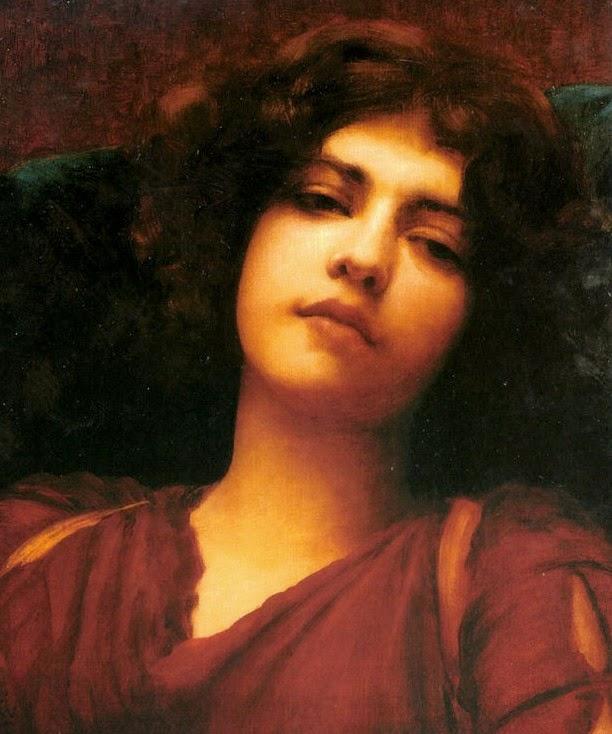
With Alfonsina, I experience heightened moments, our thoughts become one, as when she shares the total appreciation that we owe to Delmira Agustini. "She is the best of us and we should not forget it," Alfonsina tells me. It makes me happy to hear this: it is an obsolete practice in America to attribute exact worth to the living, while continuing to admire the dead.
"Yes, Alfonsina," I answer her. "She was and continues to be the best, irrevocably the best. If we forget her, it is because our race does not understand that which could be called the guardianship of the old dead: how to honour them in an ordinary way, and love them so that they might pardon the imperfect hand we use to glorify them."
![]()
(Other places, at earlier times in my life, also had me in their grip: Russia, India, Japan, Italy, ... , but I had better not elaborate otherwise I'll get diverted. I will only mention with regard to India that my wife and I brought to Ireland the greatest musician I have ever heard, and I've written about that in this still incomplete
corner of my web site. Why 'incomplete'? That all happened thirty-five years ago, and I have long intended writing up an account of how it came about. I have never been able to summon up the emotional energy to do it, but it will have to be done, soon, I hope.)
How has my view of 'Spain' (and the wider Hispanic world) - a constantly fluid, evolving view - how has it been formed? Sometimes it's moved along a little slowly - in earlier times it lay dormant for years - then sometimes a whole new experience has jolted me, has catapulted me into an entirely new place (e.g., hearing the singer
Sílvia Pérez Cruz
for the first time earlier this year, 2020. More on this below).
My view (like the best Mathematics) has been formed in a decidedly non-linear fashion. Sometimes it's a little passing moment that gets lodged in the memory and keeps coming back again and again: hearing a group of young Spaniards singing together in a street in my wife's homecity of Plymouth, just singing, so full of life.
Another memory: talking with a young woman (I regret I don't know her first name) in a hotel in San Sebastian (September 2012). She was from Galicia, and her parents had made a decision not to have children while Franco was living... So, she was only conceived after November 1975. I often think of her, and wonder what kind of life she has had. My all-too-brief meeting with her taught me as much about Spain as I would have learned from any book.
And another: hearing, in a park in Barcelona (while there, in 2000, attending a Mathematics Congress), a street guitarist playing Isaac Albéniz's beautiful, evocative Mallorca; then years later, in Madrid (Sept-Oct 2008), hearing another street guitarist (in the garden area in front of the Palacio Real) playing Francisco Tárrega's Recuerdos de la Alhambra (desgarradoramente hermoso); again, during the same visit, hearing a street cellist - near the Plaza Real - playing Bach's first cello suite.
Or one golden evening, walking the narrow streets in the Albaicín quarter of Granada, turning a corner, and hearing someone playing Bach's Goldberg Variations... I so wanted to knock on the door to... , but didn't.
Or the sight - in September 2019 - of two happy girls in a side chamber of the cathedral in Seville. Later, quite by chance I discovered that I had unknowingly photographed them... I photographed the chamber in which I found myself - my wife was doing her own wandering about - and only then did I notice their happiness in a quiet corner. It would have been improper for me to have photographed them directly (and I refrained from telling them that their obvious happiness was a simple joy to behold; for me these little unrecorded moments are what makes life worth living). So, here they are, cropped from a larger photograph:
![]()
I have now completed this list, valid up to today, Wednesday. 30th. December 2020. I have placed it towards the foot of this web page.
I will make one exception for language learning books: my 1914-pages Oxford Spanish Dictionary, which I bought here in Dublin on Saturday 16th June 2019. Dipping into this dictionary is a real joy (but at the same time slightly depressing, knowing that in a whole lifetime one could only scratch the surface of its contents).
The first Spain-related book I ever bought, on Sat. 2nd Sept. 1972, was the Pelican edition of Hugh Thomas' great classic The Spanish Civil War. I wouldn't have known at the time that it was a great classic, nor indeed did I even know who
Hugh Thomas was, and holding it now in my hand I see that I bought it when my wife and I lived in Slough (west London).
Dates in books bring back memories of the time of purchase... We had just been married the previous year, had produced Marie, our lovely first daughter, born on Lorca's birthday (5th June), and I was coming to the end of my one year as a 'Temporary Lecturer in Mathematics' at the Royal Holloway College of London University... my final salary payment was due at the end of that month... what on earth was I doing buying another book? (I see it cost exactly £1, at a time when my net weekly pay was £20, £10 of which paid for our weekly rent, and we lived on the other £10; my wife saving her weekly pay from her teaching job (French) at a rough school on a Slough street named (I'm not making this up) Shaggy Calf Lane.) Three days later I was interviewed for another temporary lectureship in Manchester University, was offered (and accepted) the job the following day, and two days later I was offered a permanent job in University College Cork in my homeland (to which, at that time, I didn't really wish to return to, and didn't), and another life entirely opened up before us.
In recent years I bought a number of other Hugh Thomas books, but I will defer details until I eventually finish my list. How I wish I could have met Hugh Thomas; his heart was in the right place.
For what it's worth I will say here that if asked which one Spain-related book would I choose above all others - were I to be limited to just one as the mythical desert island castaway - it would be (a 71st birthday gift from my wife) 'For us it was Heaven', a biography by historian Angela Jackson of a remarkable nurse Patience Darton, who served in Spain with the International Brigades (see Angela Jackson's summary in An English nurse in Spain) during its terrible civil war.
In Spain Patience Darton met Robert Aaquist (a German Communist Party member), her soul-mate and lover, and the title of Angela Jackson's memorable book is from a letter (p. 115-116) that Patience Darton wrote to Robert Aaquist's parents following his death. Everyone should buy this book, a veritable labour of love.
I will just add that were I allowed a second Spain-related book to bring with me to my castaway desert island, then it would be
Arturo Barea's trilogy memoir
The Forging Of A Rebel.
![]()
There, by far the most thrilling find was a gripping reading of Lorca's poem Romance de la luna, luna
at this page.
Who is the reader? I would so dearly love to know. I would buy her reading of the telephone directory... (I did write to Habla Cultura - in Spanish - telling them of my admiration for the reading, asking if she had done any other readings, that I would pay to have them... , but, sadly, no one wrote back to me.) In my view one wouldn't even need to know any Spanish to apperciate that wonderful declamation; just the sheer music of it is enough to give one goosebumps.
Aside. That Romance de la luna, luna poem is the first in Lorca's renowned collection Romancero gitano, and has this simple dedication to his sister: A Conchita García Lorca. Recently I obtained the
ENITHARMON PRESS edition of this collection, a book to treasure:
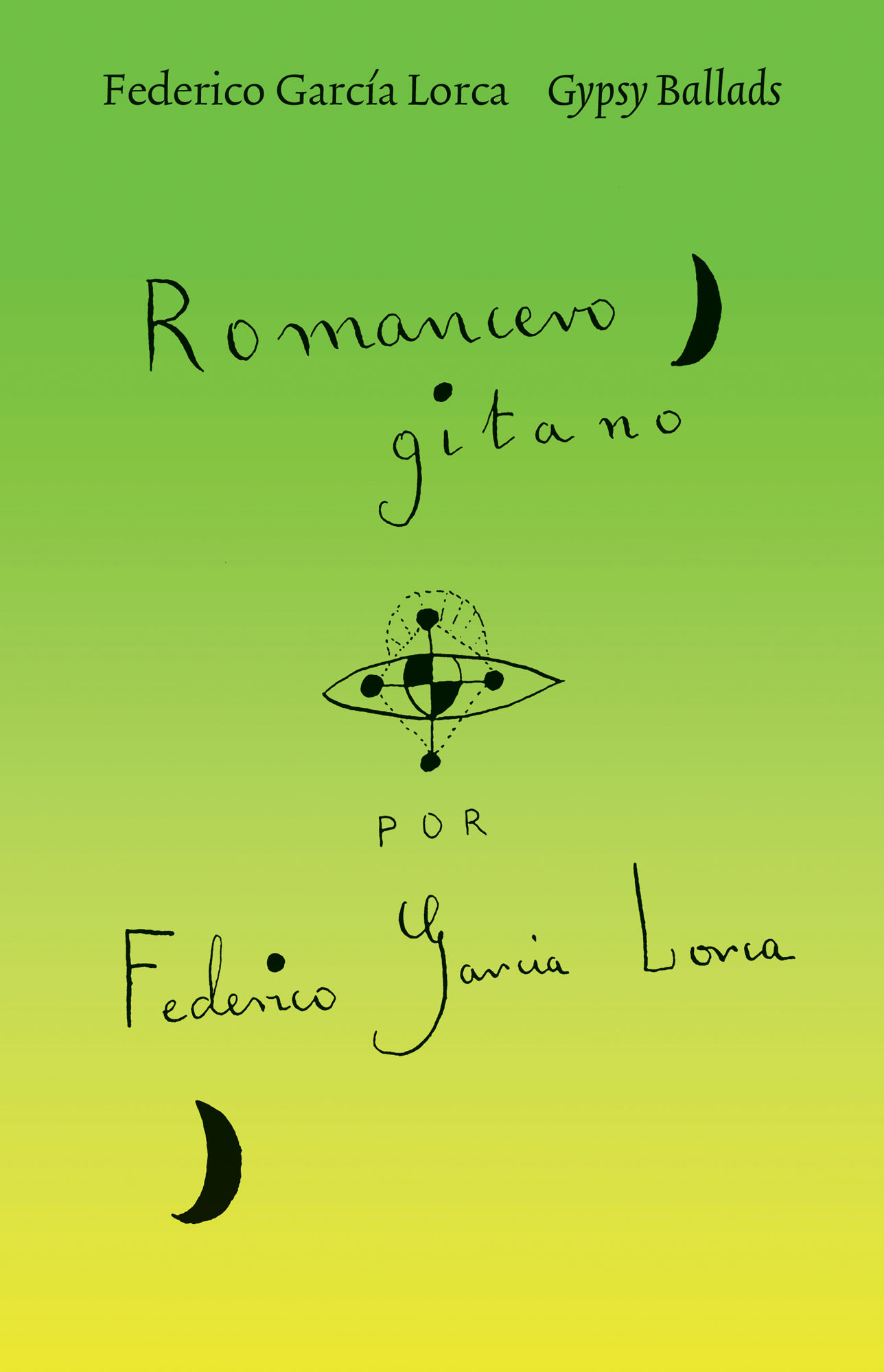
What I bought was produced by a great Madrid-based company called Visor Libros (and here is their poetry recordings section), and from them I have obtained several books and other CDs, amongst them being:
Elvira Sastre (read by E.S. herself),
Gioconda Belli (read by G.B. herself: what a voice!),
Lorca's famed
Romancero Gitano collection read by the renowned
Margarita Xirgu. I should add that on the Visor Libros/Margarita Xirgu CD there are just fourteen of the eighteen poems of the Romancero Gitano collection, but there is also her extraordinary reading of all four sections of Lorca's Lamento per Ignacio Sánchez Mejías. According to the just published, wonderful Lorca biography by Stephen Roberts, there are no recordings of Lorca reading his own work.
(Aside. Here is the 20th June 2020 Irish Times (glowing)
review of the Roberts biography, written by the famed Irish author
John Banville. In that Roberts book it was mentioned that Lorca (an accomplished pianist) had made some recordings with the famed
La Argentinita, to whom, incidentally, Lorca dedicated his thrilling, remarkable Lamento per Ignacio Sánchez Mejías. Those lovely, evocative recordings are to be found at Youtube: simply search for 'Federico García Lorca y La Argentinita'.)
From Visor Libros I also bought
a Lorca Anthology (read by the poet Rafael Alberti),
Neruda's Spanish Civil War collection
España en el corazón (read by Neruda himself),
Platero y Yo, and
Mario Benedetti.
Aside. Sometimes I acquire a difficult-to-find book through AbeBooks (what a site! the answer to every booklover's dreams), and in early 2019 - about to visit my sister Marie outside San Francisco - I bought a copy of Neruda's España en el corazón through some USA bookshop, and had it posted (free postage withing the USA) to my sister's place. Can you imagine my joy when I arrived, opened the package, and found these lovely inscribed inner pages:
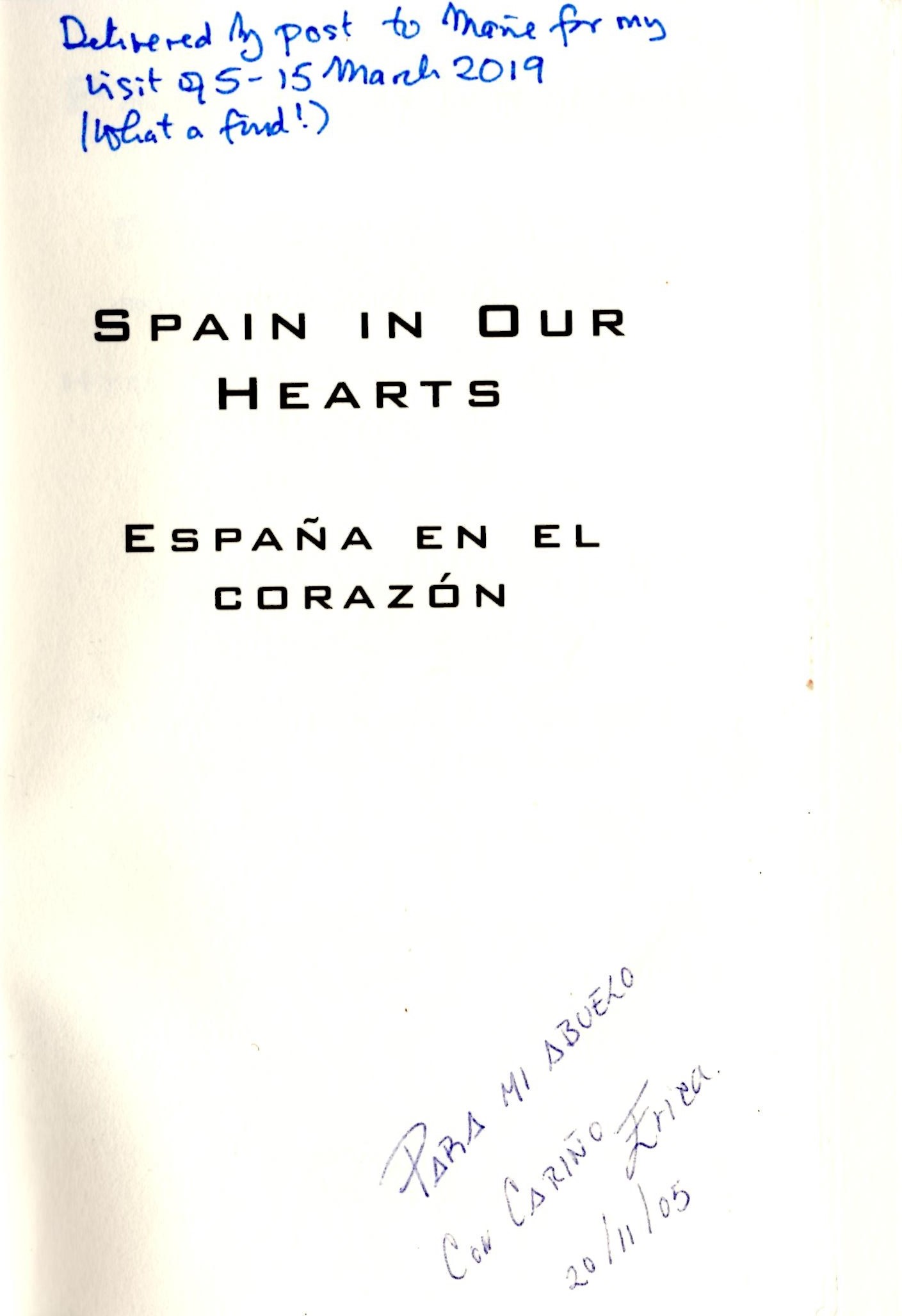
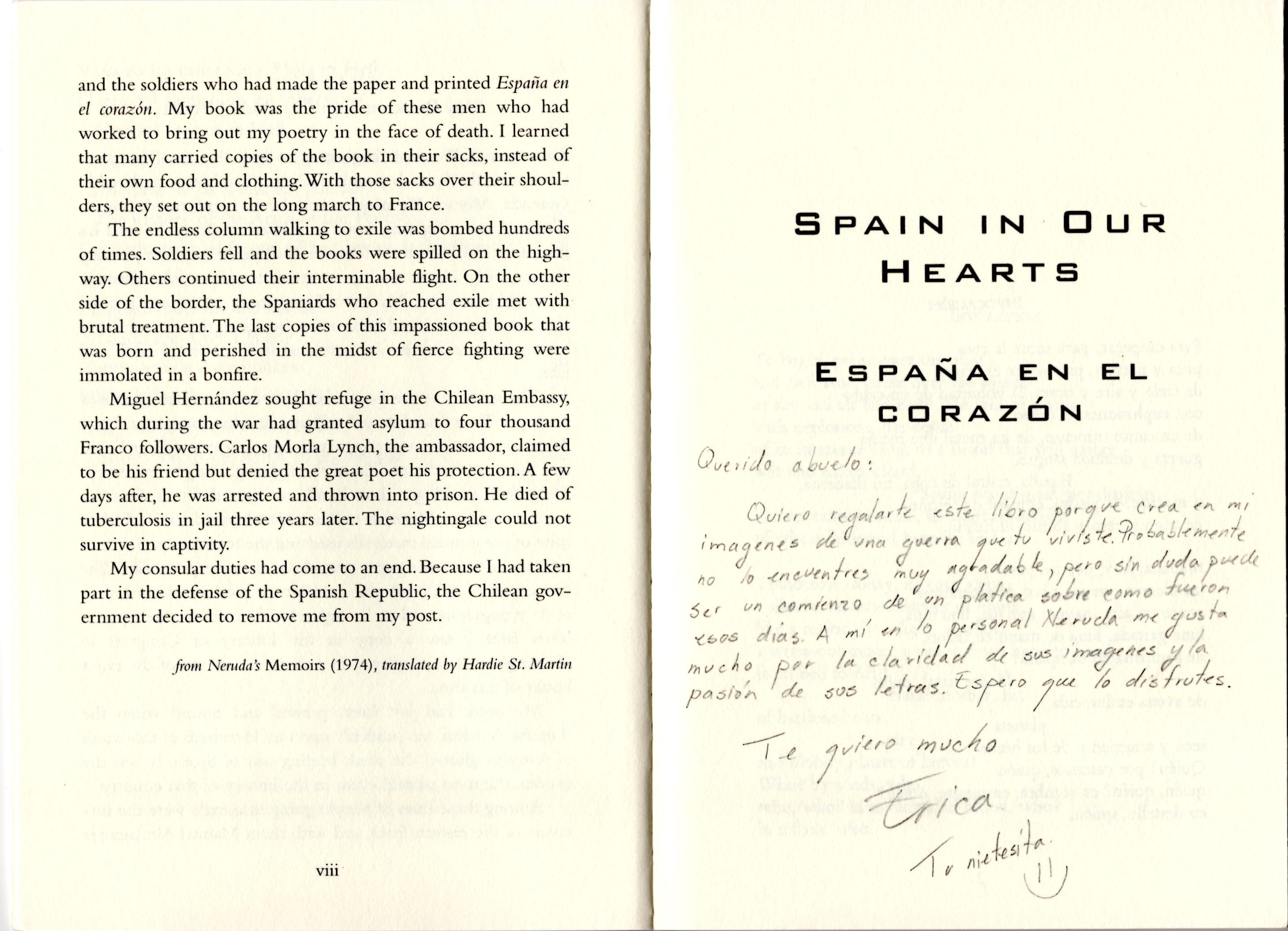
Erica, wherever you are, should you ever see or hear of this, then I will return this book to you. [end of Aside]
![]()
I bought my bilingual (861-page) copy of Neruda's Odes (ALL THE ODES, Edited by Ilan Stavans, Farrar Strauss Giroux, New York, 2017) in Hodges Figgis (Dublin's oldest bookshop) on the 8th of October 2018. Browsing the poetry section there it was, I took it down, opened randomly, and landed at page 196 where I saw Oda al diccionario. I fell head over heels in love immediately. I loved the way Neruda admits to his previous smugness and superiority before making a fundamental discovery with regard to 'El Diccionario', when he realises...
For me, just listening to Conchita Castillo read the titles of the Odes, is itself like listening to an ode. Incidentally this is how I have them arranged in my mp3 player: I have nine folders, each containing twenty-five titles, each one repeated twice, so that I hear (e.g.) Oda a la casa abandonada, Oda a la casa abandonada, Oda a la casa abandonada, ... , Oda a la pantera negra, Oda a la pantera negra, Oda a la pantera negra. It's like a form of meditation.
A lovely expression I learned from Conchita Castillo was:
No hay nada más hermoso que la mirada de un niño que lee,
and here is the very embodiment of that: our (then almost eleven year old) grandson Feidhlim, consulting a small Spanish dictionary in October 2018:
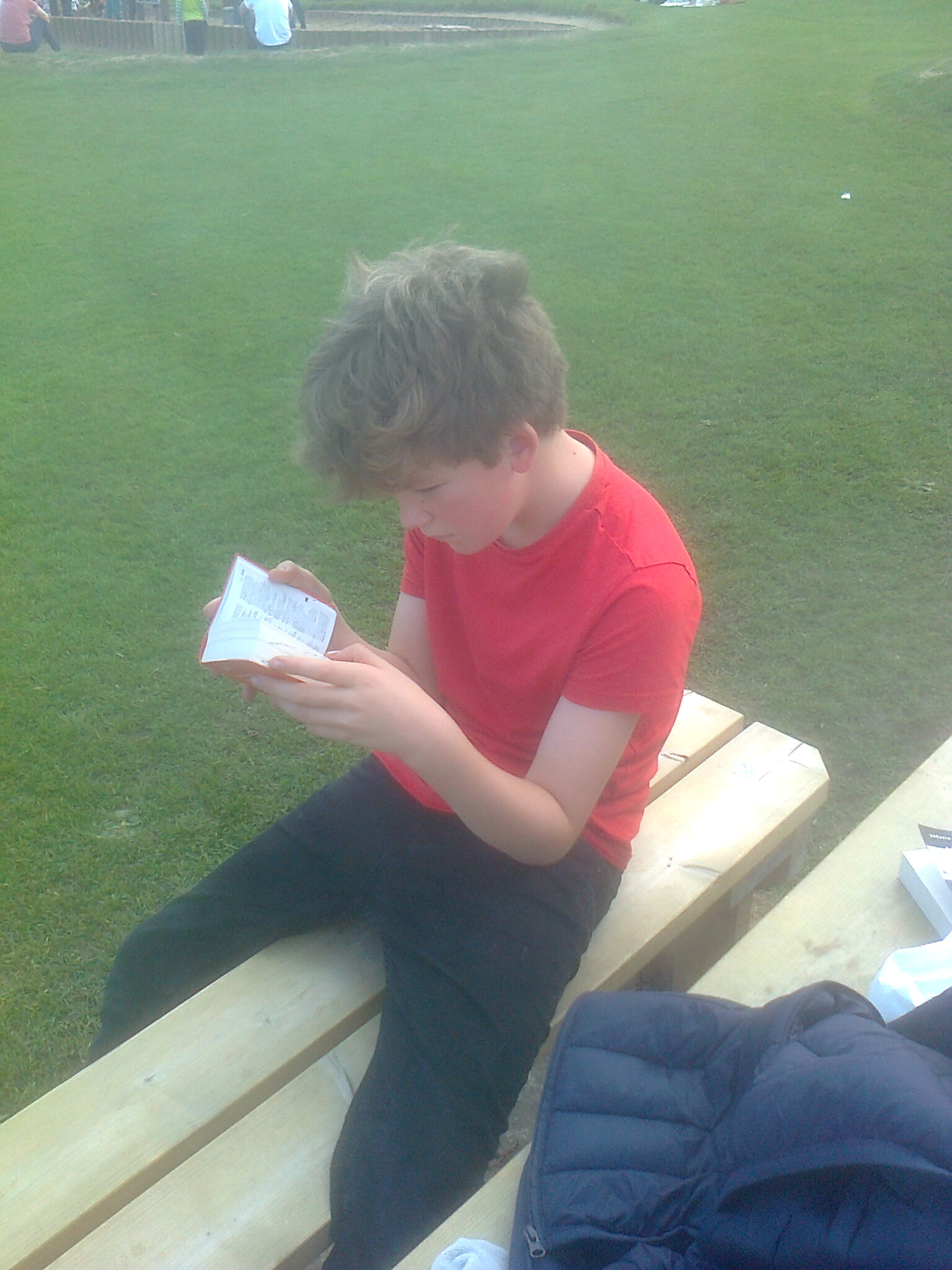
![]()
I discovered that albalearning site by a simple chance on the eighteenth of May 2020 (everything I discover always seems to be by chance). I was searching for an English translation of Juan Ramón Jiménez's Platero y yo and stumbled upon
this page. I already had the VISOR LIBROS Platero y yo CD, with its twenty-five episodes, read by
María Teresa León, and I had wrongly thought those twenty-five episodes constituted the entire work... . What a joy then to discover at the albalearning site that there are one hundred and thirty-eight episodes, that they come with the entire texts, and that the sound files may be downloaded as mp3 files!! (I have all of them on my Sony mp3 player). And, two of them are in English translation/reading as well! All beautifully read.
Then I noticed the POESÍA link at the top of the page, and there it was: a veritable wonderland, all my dreams (well, my poetry reading dreams) come true in one place.
Neruda, Lorca, ... : my head was spinning, and I wondered why I was hearing just one (wonderful) voice... The site was clearly so vast, that I at first assumed it must be the creation of a whole team of readers... and then the realisation struck me: the site is the extraordinary creation of a single, remarkable individual.
At the foot of Alba's homepage - tucked away so modestly that one might fail to see it - is a 'Guest-book', a place where appreciative users of her site are able to post some words of thanks. I do so hope that everyone who uses her site will take a few moments out of their lives to write and thank her. I would just say this: in Japan they have the beautiful concept of a
Living National Treasure. If Spain did have such a notion then I imagine that this Alba would surely be one of them.
![]()
Anyway, my great good fortune was that at some point in the second week - just as a side remark, one that could have been so easily missed - a passing mention was made (no urging, no saying: if you don't look at this then your life will be the poorer for it) to a singer: Sílvia Pérez Cruz.
The very specific link was to her singing of (the completely new to me)
Corrandes d'exili
- a Catalan language exile poem by Pere Quart (the pseudonym for Joan Oliver i Sallarès, a poet exiled from Catalonia during most of the Franco period). My reaction? How had I managed to get to my seventy-fifth year and not have heard of this, clearly remarkable singer?
Without knowing any Catalan, and recognising the word exili, anyone knowing just a little of the tragic fate of exiles from Spain into France, and beyond, at the end of the Spanish Civil war, would immediately know what she was singing about, with such feeling and integrity. (I searched for the Catalan text, learned some verses, ... , and also found a partial declamation by the returned poet himself, to a rapturous assembly in Barcelona in 1970. If you have read so far, then you must search yourself...)
Of course I searched for more songs by S.P.C., and I fell on my feet with the first one I found: a (there are several if you look) rendering by her of
Cucurrucucú paloma, wonderfully accompanied by (the fortunate!) Mario Mas. (What a memory for those live listeners to have for the rest of their lives...)
I have listened to her singing of this song, oh, hundreds of times, in just six/seven months, not by watching this Youtube video (I find it too heartrending to see her sing), and as I know a way to convert to mp3, then that's what I've done, and that's how I listen. Sometimes out for a walk, sometimes in the garden, ... . And even now after - yes, hundreds of listenings - it always sounds new to me.
My level of Spanish is very, very basic indeed, but I found the text of this song, struggled to learn the words (I eventually succeeded), and sometimes when I'm out for my daily cycle ride up a nearby hill, I sing the words (trying not to startle any passersby) to myself.
Anyone who searches will find innumerable other videos; I read someone comment on Youtube to the effect that she merited having an orchestra accompany her ... , but I confess that such recordings do absolutely nothing for me. I would only wish to hear her accompany herself, or be accompanied by a guitarist.
Not only is Sílvia Pérez Cruz a wonderful, committed artist, but from what I've seen (in interviews) she would appear also to be a delightful, modest person: Entrevista a Sílvia Pérez Cruz (how I love her pronunciation of artisticamente).
Who are (some) of the singers whom I have loved in my lifetime (for the purposes of comparison)? As a child growing up in a small Irish town in the 1950s - no TV, phones, internet, ... ; oh, we had radio (Radio Luxembourg), and juke boxes - I had no exposure to real singers. Of course we heard Bill Haley and The Comets, Elvis Presley, Cliff Richard, and others too awful to mention... But, as for hearing real singers (ones who will be remembered after we are all gone), ... nothing.
The first time I knew I had heard a real singer (by then I was well in love with Bach violin sonatas/partitas, Mozart, Beethoven, Brahms, Sibelius, Tippett, ... ) was when my wife-to-be and I heard Janet Baker sing in London in October 1969 (I still have the concert programme, somewhere). Later came Kathleen Ferrier, Feodor Chaliapin, Jussi Bjorling, Dietrich Fischer-Dieskau, Renée Fleming - all from the Western musical tradition - and then, from elsewhere, the likes of the great Indian singer Bhimsen Joshi, (as an introduction I recommend this beautiful
Youtube example; I have several LP recordings of his music, and have his
Mohan Nadkarni biography). I could name many more, but what I am trying to say is: I've heard some great singers in my time, and now I include this Sílvia Pérez Cruz in their company.
![]()
The Spain related books I've bought over the years, arranged by date and place of purchase. I shall try to stick to this formula:
number, Title of book, author, publisher, perhaps name of Editor etc, translator, (date and place of purchase, in final parentheses)
Before I begin my list of books, I include here a book - one owned by my father:
THE MARCH OF A NATION (My year of Spain's Civil War), Harold G. Cardozo, Special correspondent to the "Daily Mail"
with the Nationalist Forces in Spain. Eyre & Spottiswoode 1937 (1st. edition).
It was bought by my father in 1937 (he signed his name, and our address inside the book: Henry St., Bailieboro, Co. Cavan); I imagine
my father had read a review of it at the time. I wonder where he bought it? Dublin? London? It was one of a very small number of books my father still held at the time of his death (1995), and I have had his copy since then. (There are some photographs of my father - who was the only
truly great teacher that I ever had - in this photos corner of my web site.)
And now, my list:
In my copy are several newspaper cuttings - collected over the years - one of which concerns a Reverend Robert Hilliard, and I've scanned it into four pieces:
Hilliard1,
Hilliard2,
Hilliard3,
and Hilliard4.
Here in Dublin I've known a Martin Hilliard since the mid 90s - Martin was a Mathematics teacher, who on retirement became a Church of Ireland vicar - and it was only a few years ago that it occurred to me to ask Martin if, by any chance, he was related to "the red vicar Robert Hilliard". I was completely taken aback to hear that Robert was his uncle!
I remarked that someone (suitably knowledgeable) ought to write a biography, and Martin told me that a cousin of his - Linnet van Tinteren - was in fact doing so. Martin kindly gave me her email address and I wrote to Linnet to express my interest and support, and we had a friendly exchange of email. When her biography of Robert - her grandfather (Linnet's mother Claire, was a daughter of Robert's) - is published, I shall publicise it here at this page.
A passing word about that Falmouth to Plymouth. In the summer of 1974, coming to the end of my two-year temporary
lectureship in the Mathematics Dept. of Manchester University - and employment opportunities looking bleak - I was offered a three
year lectureship (for which I hadn't applied!) in the Mathematics Dept. of a place called the Jos Campus of Ibadan University
(Nigeria). Reluctantly I accepted (and yet, it's one of those things... ; had we not gone there we would have had an entirely different
life...), and we arrived in Jos in mid October 1974.
The university library there was so poor that when we were leaving - earlier than planned, following my wife getting acute hepatitis from
a dirty needle injection in a government hospital - I donated my entire collection of Nigerian literature (Achebe, Soyinka, ... ) to
the library as they didn't (then) have even a single copy of any of them.
Any books that one ordered had to be obtained through catalogues from abroad, and I used to frequent a dealer in Falmouth (Cornwall,
England) who specialised in Penguin Publications. It was through that dealer that I ordered Orwell's book, and it would have been posted
to Jos, but at the last minute I had to instruct them to send it to Plymouth, my wife's homecity, as we were heading there following our
forced rapid escape from Jos.
Paul Preston is Principe de Asturias Professor of Contemporary Spanish Studies and director of the Cañada Blanch Centre for
Contemporary Spanish Studies, and was one of the three contributors to Melvyn Bragg's BBC In Our Time treatment of
The Spanish Civil War. Also, there are many Youtube links to Paul
Preston.
This, incidentally, was our regular evening view over to the Alhambra: RETURN TO INSERT PHOTOS
It was from this book that I came to know of Arturo Barea and Ilse Kulcsar, which led me to obtaining his book The Forging of
a Rebel (book #41 below).
Helen Graham is Professor of Spanish History at Royal Holloway University of London (where my wife and I were students in the years
'65-'69 and '65-'71), and was one of the three contributors to Melvyn Bragg's BBC In Our Time treatment of
The Spanish Civil War. Also, there are many Youtube links to Helen
Graham.
Tucked inside my copy is a treasured signed-by-Catalina sketch (Pour John avec amitié Catalina) of a tree in
nearby Parc Montsouris. A happy memory of another time.
As a general reader I wonder how well-known this book is amongst professional historians. It certainly appears to me to be a valuable
part of the historical record, for Chalmers-Mitchell lived in Málaga before the outbreak of the Spanish Civil War, and was
active there in a humanitarian capacity during the war. RETURN
In passing. I wonder if the author (Michael Crozier Shaw) of
this 1998 M.A. thesis at University College Dublin
is related to ... . I must make enquiries.
In passing. In this utterly wretched book the authors maintain that Guernica wasn't raised to the ground by German
bombers... , rather it was the Republicans who destroyed the town (by placing explosives at intervals in the town's drains), and they did this
so as to create some anti-Franco propoganda.
Who were William Foss and Cecil Gerahty (individually or collectively)? I cannot find any mention of them anywhere, other than
their having produced this monstrosity. My mental image of the two of them is that they were members of their local branch of The
Legion of Mary.
Alba reads all one hundred sonnets at this page.
The one I most love is Soneto LXXXIX,
which begins "Cuando yo muera quiero tus manos en mis ojos:".
This sonnet has been put to music by Morten Lauridsen, one of my favourite composers. There are many recordings on Youtube, and here is one.
RETURN
Alba reads all of these at this page.
And here are truly wonderful readings (in Spanish) of this book:
AUDIOLIBRO 1ª Parte and
AUDIOLIBRO 2ª Parte by Juan Mora.
I came to know of this from the Stephen Roberts Lorca book. Morla Lynch was a Chilean diplomat in Madrid... .
A conversation with my wife, early November 2020:
Mary. Now, you're not to buy any more new books between now and Christmas...
Me. So, does that mean I can't buy Giles Tremlett's about-to-be-published 'The International Brigades'...
[and that was what she had in mind, knowing of my admiration for all his previously published books, all listed above.]
![]()
![]()